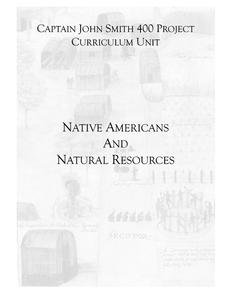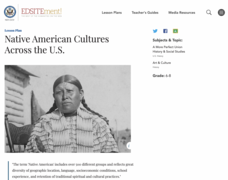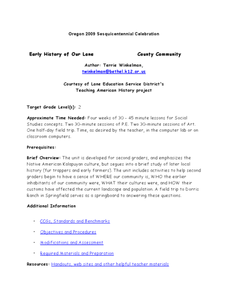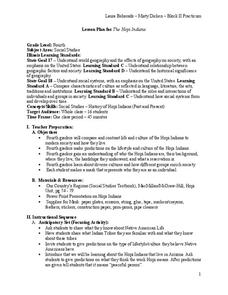National Endowment for the Humanities
Not 'Indians,' Many Tribes: Native American Diversity
Students explore what they thought they knew about "Indians." They examine the Hopi, Abeneki and Kwatiutl tribes in a game-like activity using archival documents.
Curated OER
Learning About the Kumeyaay Indians
Third graders research the Native American nation of Kumeyaay. Scholars use the internet to research past history. Through email, 3rd graders communicate with a Kumeyaay child to discover life on a present day reservation. They create a...
Curated OER
The Great Military: Map of Texas
The battle at the Alamo may be one of the most famous military campaigns in Texas history, but it is by no means the only one. As part of their study of the military history of Texas, class members research less-well-known sites, locate...
Curated OER
Native Americans and Natural Resources
North American Indian civilizations had already been in place for over 10,000 years before the arrival of European settlers. Introduce your young historians to Indian tribes that lived in the Chesapeake region in the...
National Endowment for the Humanities
Native American Cultures Across the U.S.
Students examine how American Indians are represented in today's society. They read stories, analyze maps, and complete a chart and create an illustration about a specific tribe.
Curated OER
My Important Place
The story of Chief Joseph and the Nez Perce Indians of Oregon is told here. Pupils are shown pictures of the ancestral lands of the Nez Perce, and they learn about how they were forced to leave it. Students complete an essay which...
Roy Rosenzweig Center for History and New Media
American Indians and their Environment
People could take a page in ingenuity and survival from the Powhatans. Deer skins became clothes, and the members of the Native American group farmed the rich Virginia soil and hunted in its forests for food. Using images of artifacts...
Curated OER
American Indians
Eighth graders discuss their country of origin and form work groups based on their answers. In this American Indian lesson, 8th graders locate their country of origin to the lifestyle, products and living arrangements...
Curated OER
Early History of Our Lane
Second graders study Native American Kalapuya culture. In this American History lesson, 2nd graders discover the early inhabitants of their community. They take a field trip to Dorris Ranch.
Space Awareness
The Sun Compass of the Vikings
Evidence shows the Vikings likely navigated by using a simple sundial to find their course. Videos, a short story, and discussion help bring this time period to life as they study European history with a hands-on experiment. Scholars...
Curated OER
The Hopi Indians
Fourth graders read and look at maps of the Hopi Indians and compare and contrast their lives with the Hopi Indians. In this Hopi Indians lesson plan, 4th graders learn about different cultures and answer short answer questions.
Curated OER
The Hopi Indians
Fourth graders make a mask of who they are as an individual after studying the Hopi Indians. In this Hopi Indians lesson plan, 4th graders compare and contrast the Hopi life with theirs, make predictions, and learn about culture.
Curated OER
French and Indian War
Seventh graders complete a unit on the French and Indian War. They conduct an Internet document search and use what they find to complete a document based essay about the war.
Curated OER
George Washington and the Beginnings of the French and Indian War
Students read about the causes of the French and Indian War. For this French and Indian war lesson plan, students read about the physical and human problems that lead to the war. They also learn about George Washington's role in the war.
Curated OER
President Jackson, the Cherokee and Indian Removal
Students interpret historical evidence presented in primary and secondary resources. In this Indian Removal Act lesson, students examine the act and discuss the implications of moving the Cherokee. Students...
Curated OER
History Detectives
Fifth graders investigate the significant events in America's history. Students listen to a variety of books based on significant historical events in America. Students divide into 6 groups, each of which is responsible for researching...
National Gallery of Canada
Memories of the Past
Explore contemporary American Indian art. After viewing a set of images, class members discuss the design elements of techniques present, as well as how these artists represent history and culture. Learners examine the parfleche and...
National Gallery of Canada
Make a Parfleche
Examine American Indian art and culture by observing contemporary art and creating original pieces. Class members discuss artwork included in the plan and use these images to help inspire their own work, which should represent...
Curated OER
Maps Can Help Us
First graders explore the geography of Montana by analyzing geographic maps of the area. In this Native American reservation lesson, 1st graders discuss the similarities and differences between reservations in the state of Montana....
Brooklyn Children’s Museum
Inside India
What can a Ganesh statue, hand ornament, and print block tell you about India? Introduce your learners to the geography, history, and culture of India by analyzing primary sources and using the well-designed worksheets provided in this...
Curated OER
Question What You Read
Readers test their reading comprehension after reading a nonfiction text about Paleo Indians. (This text is in Alabama: It's History and Geography, but other texts can be used.) After reading the nonfiction article as a class, they...
Curated OER
American Indian Homes in Kansas
First graders explore culture by researching U.S. history. For this American Indian lesson, 1st graders discuss the geography of Kansas and the different Native American tribes that inhabited the state and the types of homes they lived...
Curated OER
Lewis and Clark and Native Americans, Part II
Young scholars research the Native Americans living in the regions explored by Lewis and Clark. They identify the modern-day names of sites claimed by the Lakota Indians, and create a poster of the original Native American names.
Alabama Department of Archives and History
Conflict in Alabama in the 1830s: Native Americans, Settlers, and Government
To better understand the Indian Removal Act of 1830, class members examine primary source documents including letters written by Alabama governors and the Cherokee chiefs. The activity is part of a unit on the expansion of the United...























